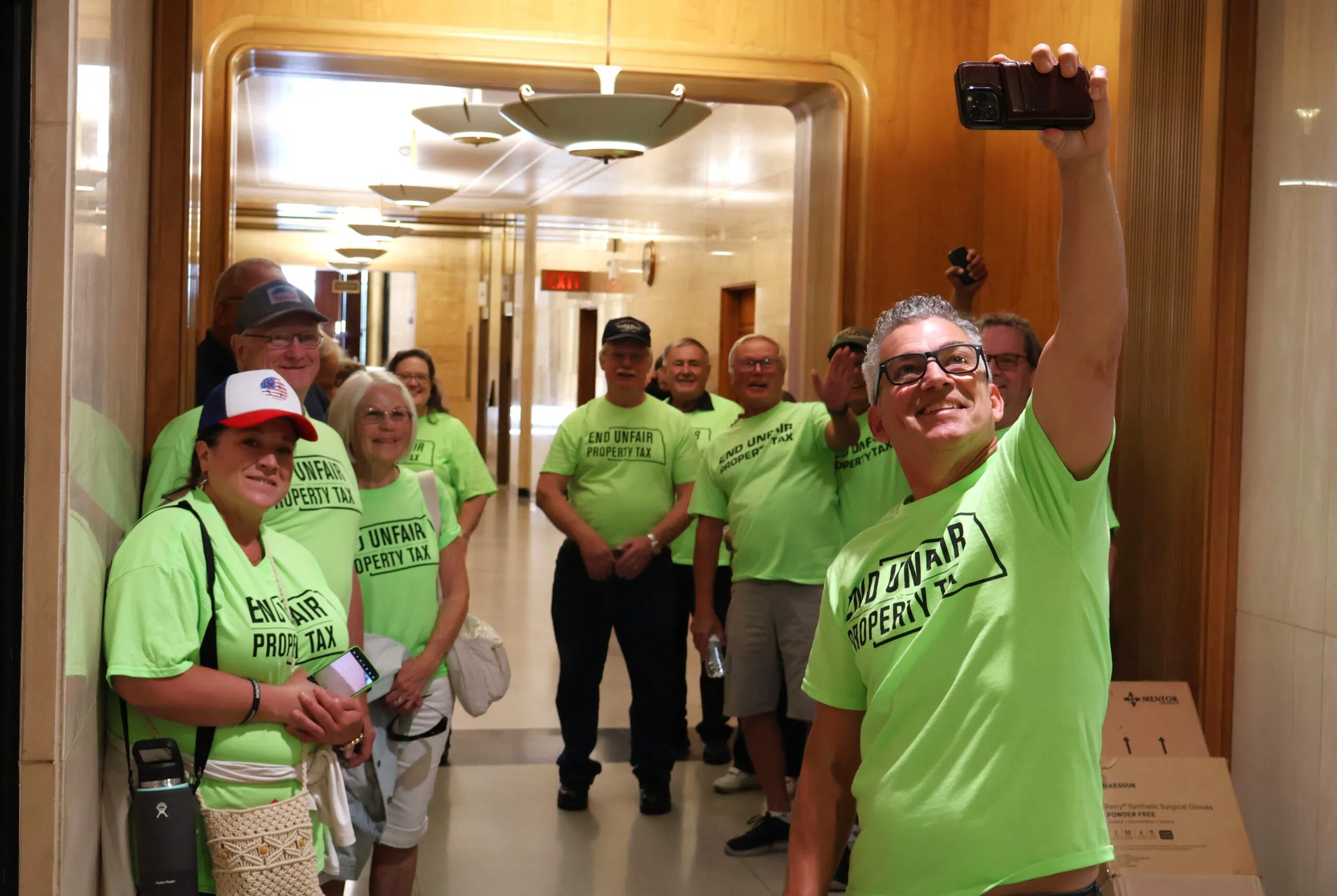
Rick Becker, right, chair of the assessed-value property tax elimination ballot initiative sponsoring committee, smiles for a group photo with other committee members while unloading boxes of petition signatures to the secretary of state’s office at the Capitol in Bismarck on June 28, 2024. (Michael Achterling/North Dakota Monitor)
BISMARCK, N.D. (AP) — North Dakota voters will decide this fall whether to eliminate property taxes in what would be a first for a state and a major change that officials initially estimate would require more than $1 billion every year in replacement revenue.
Secretary of State Michael Howe’s office said Friday that backers submitted more than enough signatures to qualify the constitutional initiative for the November general election. Voters rejected a similar measure in 2012.
Property taxes are the base funding for numerous local government services, including sewers, water, roads, jails, deputies, school building construction and teacher salaries — “pretty much the most basic of government,” said North Dakota Association of Counties Executive Director Aaron Birst.
Rising property taxes, often fueled by rising home values, have frustrated people across the U.S. North Dakota’s initiative qualified for the ballot as Nebraska legislators were poring over more than 100 proposals to ease ballooning property taxes, with a debate on a plan next week. Kansas legislators approved a small property tax cut this year and said property owners want bigger reductions.
The campaign in North Dakota is happening as the state is experiencing good finances, especially strong oil and sales taxes.
The leader of the measure drive, former Republican state Rep. Rick Becker, said it would help provide property tax relief. He said people often don’t fully understand the process around property valuations and taxation.
“They don’t think it’s fair. They just wait to get a letter in the mail telling them what their home is now valued at, and that increase in value causes increase in taxes. But yet everyone seems to pass the buck because the locals say, ‘Well, we didn’t raise your taxes’ — well, we’re paying more taxes,” said Becker, a plastic surgeon in Bismarck and unsuccessful U.S. House candidate.
If the measure passes, the state would have to replace over $1.3 billion a year beginning in 2025, according to a preliminary legislative research estimate. The state operates on a two-year budget, and the total two-year estimate of replacement revenue would be over $2.46 billion after deducting the state’s current property tax credit program amounts, according to the estimate. The state expects to collect $5 billion in general tax revenues over those two years.
Becker said local governments would still be in charge of their budgets and for generating revenue they would need above the flat, annual amount the state would replace. He floated a combination of a “municipal operations” and infrastructure maintenance fee or tax for every household and business. Those would be more fair and transparent, he said.
Where the replacement revenue comes from is up to the Legislature, Becker said. He suggested a portion could come from earnings of the state’s $10.7 billion oil tax savings.
Keep It Local, a coalition of groups with ties to agriculture, education, health care, public safety and other areas, opposes the measure, saying residents could face “profound consequences” if property taxes are eliminated.
“The measure to eliminate property tax threatens our ability to fund essential services locally, tasks our state legislature with covering a funding gap of approximately $1.3 billion per year, and jeopardizes the quality of life we cherish in our neighborhoods and towns,” Chad Oban, Keep It Local chair, said in a statement.
The ballot measure would present a monumental task for the Legislature’s budget writers, who would have to rethink funding of myriad items, said Republican state Rep. Don Vigesaa, who leads the House Appropriations Committee. The Legislature’s research agency already has put together a tentative list of areas and programs where funding could be taken, such as the state’s “Operation Prairie Dog” infrastructure fund, he said.
Regardless of the election outcome, property tax issues loom large for the 2025 session, Vigesaa said. Term limits voters approved in 2022 mean new lawmakers will eventually replace longtime members who have intimate knowledge of the budget process, he added.
Last year, the Republican-led Legislature passed a package of income tax cuts and property tax credits estimated at $515 million.









Comments